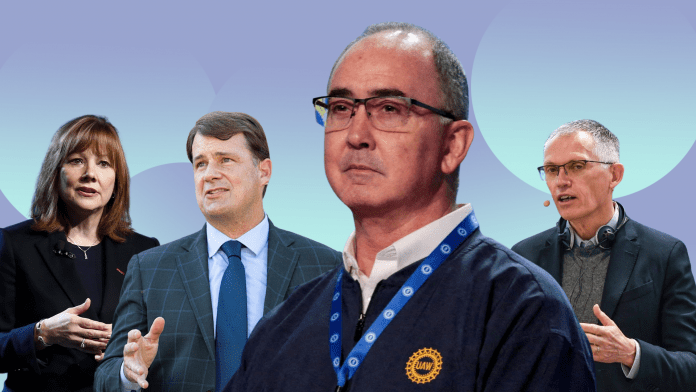In the Transformers movies, when Optimus Prime clashed with Megatron, or in The Avengers, when our heroes battled the likes of Thanos, the earth-shattering confrontations, while spectacular, always left a trail of devastation in their wake.
The unfolding drama between the United Auto Workers (UAW) and the Detroit 3 is not so different—possibly spectacular in its intensity but with ramifications that echo throughout the American economic landscape. This isn’t a mere corporate face-off—it’s an epic clash with some potentially damaging results.
The UAW’s Crusade: An Uprising or a Last Gasp?
Enter Shawn Fain, whose rise to the UAW president seems scripted for the big screen—it probably was. Barely securing his leadership, Fain has since been relentless, verging on the militant.
Admittedly, I’ve seen unions as market saboteurs. Yet the simmering discontent among workers staring into the maw of an AI-dominated future is hard to ignore. Fain’s take on the EV paradigm shift? Less a warning, more a battle cry. Automation isn’t a specter on the horizon; it’s a pressing threat. The wage disparity at the Ultium Cells LLC factory? It’s not just numbers—it has the sound of a declaration of war.
The whopping $10-$16 less per hour wage chasm at the Ultium Cells LLC factory compared to other GM work sites? More than a concern—it’s an outright insult. While the boardroom elites whine over vintage wines, it’s the ground troops, the workers, who bear the brunt of corporate decisions while facing potential annihilation on the altar of ‘progress’.
The Automakers: Visionaries or Profiteers?
Conversely, the automakers seem more entangled by the future than shaping it. A pivot to EVs? It’s a Herculean feat, especially when it seems 94% of their dwindling customer base not only didn’t ask for them, but they’re also not signing up to purchase them.
Their cries of hardship might evoke sympathy if not for the audacity of the UAW’s 46% wage increase demand. It’s audacious, but isn’t it time the behemoths got a wake-up call?
And the CEOs? Their eye-watering salaries, while perhaps a testament to the risks they bear, also smell of corporate gluttony and imbalance. With a nearly $29 million paycheck like Ms. Barra has, couldn’t the collective OEM C-suite not spare a bit to address workers’ demands? One wonders.
The Presidential Meddling: Savior or Opportunist?
And then there’s the $58 million net worth ‘everyman’ President Biden, leaping into the fray. He’s reminiscent of a character seeking to mediate cosmic battles. His calls for unity? Perhaps they’re more about the ballot box than genuine economic concerns.
His romantic “win-win” vision? Think of what “win-win” has meant in your work life. Now you see why that idea seems as elusive as peace in a fictional universe torn by conflict. Is this heartfelt diplomacy or mere shallow political theater?
And can the Biden administration really help? Or should we remember these words from Ronald Reagan, who reminded us that “the nine most terrifying words in the English language are ‘I’m from the government and I’m here to help.’”
The Inferno Ahead: Who’ll Emerge from the Ashes?
What’s unraveling is not a mere disagreement—it has all the marks of a cataclysmic uprising. A reflection, perhaps, of the greater societal chasms that underpin our society.
Unions, once the guardians of the working class, now teeter on the edge of obsolescence. Yet their passionate outcry in our digital age is impossible to ignore.
Automakers, despite their grandiose claims, appear caught in a storm largely of their own making, enabled by a short-sighted government.
As the climax nears, there’s a critical takeaway: Much like the innocent bystanders in Transformers and The Avengers, it’s the American taxpayer who might bear the heaviest burden from the fallout of this corporate clash.
And here’s another inconvenient truth: Robots and AI don’t pay taxes or buy cars, houses, food, and clothing to support the economy.
So, we’re at a pivotal juncture. This time, the tectonic clash of industry and labor isn’t just a skirmish, and we’re not mere spectators; the aftermath of this epic battle has the frightening potential to damage the very foundations of our economy.





